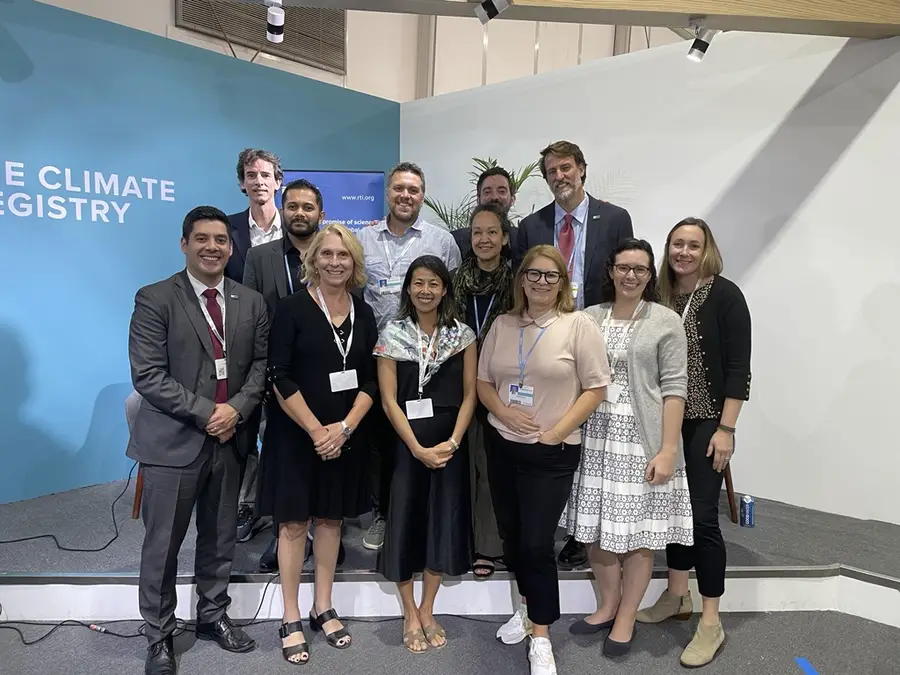
Collaborating with Global Leaders to Move the Needle on Tackling the Climate Crisis
It’s no surprise that there is a growing sense of urgency to address the impacts of climate change. There is no time to waste and using evidence as the basis for decision-making will be imperative to making the best decisions we can and to ensuring actions are effective and sustainable. As official observers accredited by the United Nations Framework Convention on Climate Change, RTI experts joined other scientists, researchers, and implementers in Egypt at the 27th Conference of the Parties (COP27) to contribute to accelerating climate action.
The COP is the United Nation’s largest annual climate conference. It brings together world leaders to commit to global climate goals and track progress towards limiting warming to 1.5 degrees Celsius above pre-industrial levels. COP27 resulted in a breakthrough agreement on “loss and damage” funding for countries vulnerable to the impacts of climate change. The COPs also attract participants from every corner of the globe. COP27 had over 49,700 participants, making it the largest COP in history. We sat down with some of our experts to get their personal reflections from COP27. See what they had to say below:

The impacts of climate change are escalating, leaving countries and communities, especially those most vulnerable, struggling to adapt quickly enough to the changing climate. We can’t afford to wait, but we also need to make sure that the climate actions we take are done with eyes wide open. As we are all moving towards concrete climate action after COP27, we need to be sure that we take a holistic and systems-level approach to fully understanding the consequences – both intended and unintended – of our work. We want to take action to reduce emissions, help communities adapt to extreme climate events, improve livelihoods and foods security, but we need to be certain that we don’t inadvertently exacerbate inequality or cause negative climate impacts for one community versus another.
Tracy Mitchell, Director of Resilience and Climate Adaptation

It was great to see the increased focus on agriculture and food systems at COP27. Food systems account for a substantial share of global greenhouse gas emissions and have major implications for global nutrition and health. Agricultural production also has important interactions with deforestation, land use, and biodiversity. This year was the first time there was a COP pavilion dedicated to food and agriculture with discussion of an expanded presence at COP28. Increased attention from governments, researchers, and global finance to both mitigation and adaptation within this sector is vital for making progress in addressing climate change.
Alayne Potter, Senior Water, Sanitation, and Hygiene Manager

For me, a successful outcome of COP27 was how many stakeholders reiterated and drove home the importance of regional and community-specific solutions to climate change. In climate change mitigation and adaptation efforts, both within the U.S. and internationally, community buy-in is key to ensuring project success. It will be difficult for off-the-shelf solutions that do not capture the nuances of community voices and needs to create truly climate-resilient communities.
Pablo Torres, Associate Director, Energy and Climate

Being my first COP, the excitement to join RTI’s COP27 delegation in Sharm El Sheikh was at peak from Day 1 until the last minute. It was phenomenal to see how government agencies and organizations from all over the world—over 45,000 participants—came together to prioritize action items to save the planet from climate change impacts. There were intense discussions on climate adaptation, net zero emissions, and methane reduction. I was especially impressed with the agreements that Bangladesh was able to push forward regarding climate resilient activities.
Jonathan Schwarz, Associate Director, Environment
Our experts also hosted and participated in several events on nature-based solutions, climate mitigation, locally led solutions, urban resilience, climate finance, and climate adaptation. Visit our Center for Climate Solutions to watch the recordings.



